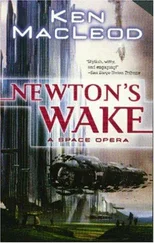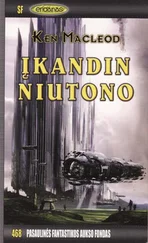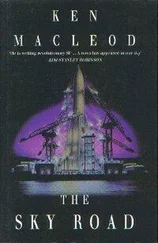Look at the transcript! Do they really expect us to believe that the probe team didn’t know about the prerecorded message? That they didn’t know the bugs would parasitise large organisms? That the aliens would find the bugs? Or, for that matter, that they decided so casually to start fires on Destiny II? What really went on at that jury was not what we’ve been told.
Horrocks Mathematical’s head rang with incoming messages. Filtering them made it ache. A scanty sampling had determined him to ignore most of them. He now knew what Atomic had meant by “hate mail.” The strange thing was that here in the Engineer’s Dream, where he’d taken refuge, he was the toast of the company.
“This’ll get the little breeders back to work,” someone had said. The sentiment was general. Micro-gee trainers had seen a significant slackening of business as the alien virtualities had gripped the ship generation. Constructors’ orders for seeding vessels had dried to a far lower level than even the preliminary trickle that would be expected at this stage of the process.
Horrocks closed his eyes and shook his head. He suspected he had drunk too much. When he opened his eyes he found Genome looking at him with curiosity and concern. “You can turn it off, you know,” she said.
“What?”
“Your headphone. The messages will just reroute to your externals.”
“Oh, right. Of course.”
He’d never had so much incoming to handle; the bombardment itself had prevented him from recalling how to cope with it. He closed his eyes again, focused his mind, searched his options, found the choice and made it. For some reason the cutout presented itself to his natural sensorium as an aural hallucination of a distinct clunk . The silence was joyous, the relief ecstatic. “It’s like when you’re a little kid,” said Genome, “and you bang your head on the wall just for the feeling you get when you stop.”
“You did that?” said Horrocks, baffled.
“When I was very small,” said Genome. She looked like she wanted to change the subject. “Speaking of kids, your favourite flatfoot has been badmouthing you again.”
Horrocks swigged. “I’m not surprised. Nor interested.”
“Take a look anyway,” said Genome. She sent him a ping and outlined with her forefingers a rectangle in the air; the ping carried the data, the gesture evoked the page for him. As he scanned the text a cross-reference niggled at his mind, too persistent to brush away. There was some real urgency there, of the kind that most people would blush to attach to a mere angry note.
“She sent me a call, too,” said Horrocks. He grinned at Genome. “Mind if I share it? I might need some moral support.”
She squeezed his shoulder. “Go ahead.”
Horrocks sent a tightly specified query into his log of stored calls. It returned as text. Atomic had wasted no bandwidth on voice, let alone video. That was what he thought first; then he noticed the heavy cladding of encryption around the message: she’d had no bandwidth to waste.
“Hello Horrocks,” she’d written. “If I know you, what went on in that jury went right over your head, just as it would have gone over mine. The difference is, that you have it in your head. I urge you to take some time to take a look at it. When you’ve done that, I’m sure you’ll know what to do, and I wouldn’t dream of trying to influence you. But do please take a look. Regards, Atomic Discourse Gale.”
“At least she’s polite,” said Genome.
“There is that,” said Horrocks. “I expected my ears to burn.”
“Are you going to do what she asked?”
“Yes,” said Horrocks, dreading the prospect of wading through screen upon screen of elliptical, high-density discourse. “When I’m sober.”
Genome ran a hand along her bandolier of inhalers and extracted a slim green cylinder.
“Snort this,” she said, holding it up in a billow of blue sleeve. It smelt like pine.
Horrocks felt as if he’d wakened from a deep, refreshing sleep eager to tackle an absorbing job of work. The room became sharp and clear, a tawdry hang of red-tinged light and lolling bodies and loud, empty talk.
“Don’t look at me like that,” said Genome.
“Sorry,” said Horrocks. “It isn’t you, it’s—”
“I know,” said Genome. She gave him a conniving smile and a hard shove. “Go away and read your transcripts before it wears off.”
Her push sent him to the exit. He caught the jamb on the way through, swung around and thrust off, looking for somewhere quiet. The corridor was wide, elliptical in section, and heavy with colour-coded utility piping and small bulk transport conveyor belts. A practice-habitat component a couple of metres across moved past him, its glum owner straphanging behind. It was heading away from the locks that led to the main cylinder. Horrocks drifted, kicked, drifted again. He noticed an unobtrusive tag marking an access tube that went off to one side in an inward direction. It labelled it as leading to the engine vault.
The engine vault was a place for quiet contemplation and discreet assignation, a place where people tended to go when they were very young or very old. Like the rare transparent panels in the outside of the cone where one could look at the stars as directly as it was possible to do through metre upon metre of flawless sheet diamond, and experience — or at any rate, appreciate — the very photons from the stars themselves impact upon one’s very own retinae, the engine vault was a site of natural wonder, and one whose awe few presumed to blunt with undue familiarity.
He jackknifed in to the tube and pushed along it. After twenty metres he reached the open far end. He jammed his hands against the sides and moved forward so that his head projected out into the vault. He found himself somewhere near the middle of the wall of the vast space, a couple of hundred metres above the floor and as much below the ceiling. Other such pinprick holes were visible here and there on the inward-curving sweep of the wall below as black dots. A few tens of metres from his face, the engine loomed like a cliff, stretching off into a blue-hazed distance half a kilometre on either side. In its complexity too it looked like a cliff-face, but Horrocks knew that every curve, every hollow, every flange and protrusion, every minute pit in it was not the random result of weathering but features whose function he could not guess, but might some day centuries hence aspire to learn.
Sublime as the sight was, it took a knowledge of what it did to take the full measure of its magnificence. Like its polar counterpart in the rearward cone, the titanic engine was a cosmogonic machine. At its core was a process that — second by second when it powered the ship’s flight, hour by hour when, as now, it powered only the sunline — compacted the equivalent of a multi-megaton nuclear explosion into a space the size of a hydrogen atom. Its primary effect was to accelerate the reaction mass to relativistic velocities. As a side effect, invisible but inevitable, it generated universes. From each compacted explosion, like a stray spark from a hammer, a new singularity exploded out of space-time and inflated in an instant to give birth to a new cosmos. Some inconceivably minute fraction of the energy of that inflation could be tapped to make the engine self-sustaining. Invented in the Moon Caves, the cosmogonic engine had given man the stars. At one level efficient beyond cavil, on another it was the most profligate of man’s devices: it blew multiple universes like bubbles, for the mere sake of moving mass, and at an average speed of 0.01 c at that.
Horrocks gave these considerations a moment of due respect, wedged himself comfortably in the hole, accessed the transcript files in his mind and settled down to read. It didn’t take him long to discover that the only thing he could reliably make sense of were the names. The actual dialogue was so elaborate, so allusive, so technical and at the same time so playful that it would have taken him years to parse it, decades to uncover evidence of a conspiracy or a hidden agenda. For all he could tell, this entire arcane undertow to the exoteric proceedings of the jury might have served only to reinforce and document what had been spoken in the open. After struggling with it for a while, he pasted the entire transcript to a call and sent it to Atomic. “Do what you want with this,” he said.
Читать дальше












